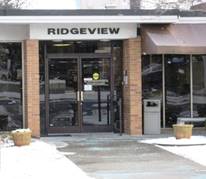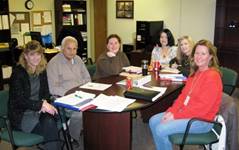Ridgeview Psychiatric Hospital and Center Inc.’s Modified Assertive Treatment for Co-Occurring Homeless, MATCH, program of Oak Ridge, Tennessee, was awarded a SAMHSA treatment for the homeless grant on September 30, 2006. MATCH addresses a significant treatment void of the rural, geographically isolated East Tennessee Appalachian homeless population with co-occurring disorders. By implementing individualized, community-based, integrated treatment services that are linked with a seamless referral system to housing and employment programs, MATCH hopes to serve 330 people during the course of its five-year grant.


MATCH Offices
MATCH uses a mix of evidence-based and promising practices, including: A.C.T. (modified) model; stage wise Intervention; assertive outreach; motivational interviewing; counseling/social support; skilled group modules (Matrix); and harm reduction model. Its services include: intensive case management that includes weekly education groups; client-specific employment and housing plans; RN consultation; staff psychiatrist appointments and medication management; individual service planning. Furthermore, each client’s current condition and services are discussed during a weekly treatment team meeting. The MATCH team has found great success with these practices.
The changes clients have demonstrated in substance use, housing, employment, and mental health symptomology from intake to 6-month follow-up in the first four years of the grant are significant. The following data is taken from 229 intake Interviews compared to the matching follow-up interviews as reported on the GPRA.
4-year substance abuse change rates:
Abstinence: +1600%
Marijuana use: -40.2%
Cocaine/Crack use: -57.5%
Methamphetamine use: -57.9%
4-year housing and employment change rates:
Living on the street: -77.2%
In own housing: +348%
Employed full time: +500%
Employed part time: +156%
While mental illness symptomology is harder to quantify, reduction was shown in the following areas:
Depression: -6.8%
Anxiety: -4.5%
Hallucinations: -20.6%
Trouble controlling violent behavior: -37.8%
Suicide attempts: -82.4%
“ One the greatest compliments you can receive in a program that seeks to help people achieve recovery and make dramatic life changes is to have those members not only have good things to say about the program, but also they take action to show they mean it. Our program members often outreach to others in the community they come in contact with and they give them the information about joining MATCH. This is an outcome that we all very proud of.” Jill Brown-Silvey, MATCH Housing and Employment Coordinator
The MATCH staff consists of a multidisciplinary team containing: a program director; three case managers; a housing/employment specialist; a registered nurse; a psychiatrist; a research associate; and a contracted lead evaluator.

MATCH treatment team from left to right around the table: Jill Brown-Silvey, Housing and Employment Specialist; Dr. Babulal Dudani, Staff Psychiatrist; Heather Clark, Case Manager; Marjorie Partin, Case Manager; Cassandra Hutcheson, RN; Sherrie Webb, Case Manager. Not Pictured: Brian Buuck, Project Director; Richard Chirip, Program Director; Al Keim, Research Associate; and Dr. Tom Doub, contracted lead evaluator.
When CHAB asked the staff what they found to be the most interesting applications of the program, Brian Buuck, Project Director, said, “[We provide] service delivery to an isolated, rural Appalachian population [with] a successful graduation rate of 52 percent. [We also have] an intake rate of 100 percent of the mandated target and a six-month follow-up rate of 100 percent of those eligible for follow-up.”
MATCH clients believe in the program, “MATCH believed in me, and helped me when everyone else had given up trying.” “I liked MATCH because they didn’t care that I had messed up and had been in jail they still helped me with my addiction problems, getting housing and to get a job.” “MATCH is like a new family for me and I am not homeless and drinking everyday since coming to the program.”
Strong partnerships contribute to the success of the program. Supported by and integrated into the Ridgeview Mental Health Center, MATCH also depends on local housing authorities, community health providers, and local substance abuse treatment providers. According to Buuck, “Our contracted lead evaluator (who is also a member of the MATCH Advisory Board) has provided support and guidance for program improvement.
